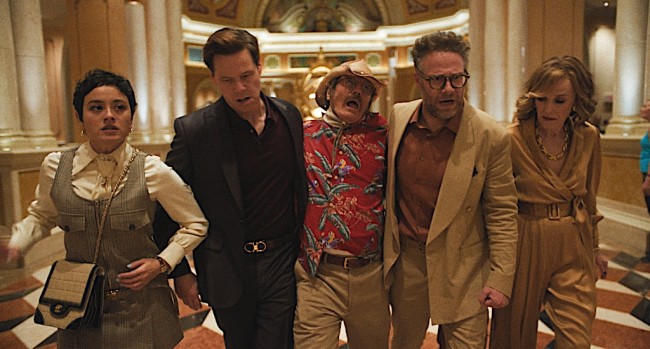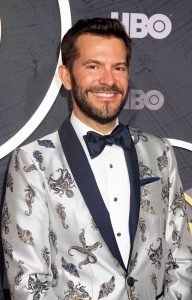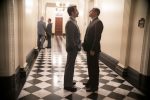Interview with Peter Huyck, Alex Gregory, and Frida Perez on the Creation of “The Studio” for Apple TV

In a spirited conversation, the creatives behind The Studio which garnered 13 Emmys — Peter Huyck, Alex Gregory, and Frida Perez — opened up about the process of bringing their comedic series to life on Apple TV along with juggernauts Seth Rogen and Evan Goldberg, who also directed.
The series serves as a heartfelt and humourous exploration of the internal chaotic machinations of contemporary Hollywood. The Studio tracks the life of recently promoted Matt Remick (Seth Rogen) as head of the floundering Continental Studios. He’s both a self-styled cinephile and hard-nosed businessman barely keeping his head above water. He echoes William Goldman’s immortal words about Hollywood – “Nobody knows anything!”
Capturing the Essence of Hollywood
Frida: We wanted to capture the real “belly of the beast” experience of working in Hollywood today. When we began writing in 2023, our goal was to reflect a contemporary outlook, showcasing what it feels like to be both exhilarated and overwhelmed in this industry. We want viewers to feel the pulse of Hollywood — the excitement, the panic, the stress, and everything in between.
Peter: Hollywood itself becomes a character in The Studio. The inner workings and emotional rollercoaster of the industry are just as captivating as the entertainment products that come from it. We aimed to provide a personal perspective on the highs and lows of Hollywood life — how every day can be a mix of excitement and stress.
Alex: One of the distinct elements we wanted to incorporate was authenticity. Many Hollywood satires tend to portray power struggles and backstabbing. However, our experiences collectively have shown that a lot of people in this industry are genuinely trying to create something meaningful. We believe that even in the chaos, there is a sincerity and commitment to the craft that we wanted to highlight.

Pete Huyck. Photo by MediaPunch Inc
Defining the Genre: Beyond Satire
Peter: We draw a lot of inspiration from The Larry Sanders Show [where Peter and Alex got their start], which was a brilliant satire of late-night television. While we don’t necessarily label our work as satire, it certainly had a profound impact on our creative vision. It blended humor with a sense of truth that resonates with our aspirations for The Studio. It’s less about mocking the industry and more about holding a mirror to it.
Frida: We aim to create a comedic reflection of Hollywood while allowing our characters to breathe and develop organically. We didn’t want to create a heavy-handed critique of the industry. Instead, we’re crafting something that showcases both the absurdities and the inherent drama of working in Hollywood — a balance that can be quite challenging to find.
Alex: The goal is to infuse humor into relatable situations. In crafting The Studio, we realized that comedic moments should come from the characters and their interactions. We wanted viewers to recognize themselves in these situations, whether it be the stress of unreasonable deadlines, the absurdity of certain meetings, or the bizarre encounters that shape our lives.
The Collaborative Process: Building the Foundation
Frida: In our initial meetings with Seth Rogen and Evan Goldberg, we made a conscious choice to turn back-and-forth debates into constructive conversations. Each of us brought unique perspectives, and having so many strong voices in the room was essential. It’s like building a house; every element contributes to the overall design. You don’t want five people in the room each with the same perspectives. During the early meetings, we asked, What is this show? How is this different? How is this the same? How do we stand out without alienating people?
Peter: During those early brainstorming sessions, we asked ourselves fundamental questions about what The Studio was and how we wanted to differentiate it in an era that is overflowing with television content. It was about finding a balance of staying true to the heart of the narrative.
Alex: We often found ourselves discussing pacing, shooting style, and how to infuse our love of filmmaking into a show about filmmaking. For us, the format and style of the show were just as important as the storytelling itself, which ultimately influenced the direction we took. It was like laying the groundwork for an entertainment experience that would feel multi-dimensional.
Navigating the Stormy Sea of Television
Frida: We realized early on that standing out was one of our primary concerns. The volume of content being produced right now is staggering, and we needed to be innovative. Our aim was for the show to feel distinctly different while still paying homage to the art of filmmaking.
Peter: We discussed how to recognize and honor Hollywood traditions while carving out our niche. Through our characters, we wanted to create depth and soul, allowing audiences to connect with them on a personal level. It was essential for us to build relatable stories that also carry an emotional weight.
Alex: From the get-go, we wanted to explore universal themes — ambition, failure, and the challenges of creativity — within the context of Hollywood’s unique environment. By incorporating relatable struggles, we hoped to create a narrative that resonates with anyone who’s ever chased a dream, whether in the arts or other fields.

Alex Gregory. Photo by Alex Gregory
Who Is Matt Remick? Character or Caricature?
Frida/ Peter/ Alex (talking over each other): Matt Remick is an interesting composite character because he’s our window into the show. We used things that Seth is known to be good at, like being like a good comedic lead who is making a lot of stupid mistakes. He’s not being super rational, but you still sympathize with him and understand where he’s coming from. He’s also lonely and doesn’t have a personal life outside of work.
Matt is like a lot of studio heads – really loves films, loves filmmaking, but is in this unfortunate position where his job is to be the responsible person for the company. He has to be the parent of the filmmakers and tell them what they can or can’t do. We really like that internal struggle with somebody who loves movies, but whose job is to ruin them.
Matt wishes he were Robert Evans, that he were making Chinatown and The Godfather. Instead he has to make the Kool-Aid movie. Can he be happy doing that? That’s the question we’re constantly asking.
Avoiding Character Stereotypes
Peter: We never used them. Once you lose that tether to reality, I think you don’t care as much. That’s why it’s so important that the show feels grounded, even as it builds to bigger and bigger comedic set pieces. Another show that I think we all love and were inspired by was Seinfeld. The goal of the show is to stay very grounded and real and then still deliver actual hard comedy.
Alex: We never wanted to like deliberately crap on anyone or anything. We tended to not do any jokes that were mean spirited. Our characters are always the butt of the joke. They’re never punching down. They’re always trying to please people.
The Role of Cameos: A Unique Twist
Frida: Selecting cameos was a strategic endeavor, one that was tied closely to the episode’s themes. For example, incorporating Ron Howard was not just an effect of his fame, but also about bringing an unexpected twist to his established persona. He’s known for his serious film career, so imagining a twist where he adopts a silly side was particularly amusing to us.
Peter: We would identify the episode’s concept first, and from there, brainstorm potential cameos. It was essential to ensure that every guest has a moment to shine while injecting their unique flair into our narrative. The cameos needed to enrich the story contextually, giving audiences something to chuckle about while also surprising them.
Alex: In terms of vision, it was less about getting just anyone who was available. We wanted to create moments that felt organic within the show’s context. We believed that chemistry is key, and each cameo had to feel right in relation to the character and plot of that specific episode.
Each cameo asked, What’s my bit? What’s my joke?, so it’s not just like walking on and being famous. We were very intentional about not being too lacerating or too broad to really like make it true to who they were.

Balancing Humor and Authenticity
Frida: We are committed to ensuring that our humor remains rooted in real experiences. While we want to make audiences laugh, we also want to portray those authentic struggles that people in Hollywood face. The humor in our show arises from the absurdity of those situations and the relationships between characters.
Peter: The challenge and joy come from translating those absurd moments into laughter — shifting perspectives while maintaining sincerity. In many ways, the show serves as a creative tapestry, reflecting the highs and lows and finding the comedic gold within them. We want to remind audiences that laughter is often how we cope with challenges.
Alex: Moreover, we believe in humor’s power to bridge divides and create shared experiences. At its core, The Studio is all about connection — between characters, within the industry, and with the audience. That connection is made even stronger when we can laugh together, finding joy in shared struggles.
Inside the Writers’ Room
Frida: It was really collaborative the whole way through. We’re all giving notes and thoughts on every episode, whether or not we were writing them. We were all involved in the process of breaking and developing each episode. Once we felt like the episodes were strong enough or had the bones, we split up. We chose a writer based on who was really interested in one particular episode.
It was constantly evolving. Even on set, we were pitching jokes. We were cutting scenes. We were cutting lines. And adding them.
Looking Forward: The Next Season of The Studio
Frida: We feel a deep sense of thrill sharing this creation with the world. There’s an infinite variety of stories within Hollywood worth exploring, and we’re just at the beginning. Each episode provides an opportunity to dive deeper into the character dynamics and industry antics that resonate with our experiences.
Peter: We are confident that audiences will appreciate the authenticity we aim to convey. Our hope is that The Studio resonates with anyone who has navigated challenges in their career while also recognizing the humor in that journey.
Alex: Ultimately, our ambition is for viewers to walk away feeling fulfilled. If they can see themselves in our characters and share a laugh, then we’ve succeeded. We’ve approached the industry with a light-hearted touch, offering the audience a fresh perspective that invites them to engage with the characters and their worlds.
[More: Alex Gregory Pokes Fun At Creative Executives In The Studio]
Join the Discussion!
Related Articles
Browse our Videos for Sale
[woocommerce_products_carousel_all_in_one template="compact.css" all_items="88" show_only="id" products="" ordering="random" categories="115" tags="" show_title="false" show_description="false" allow_shortcodes="false" show_price="false" show_category="false" show_tags="false" show_add_to_cart_button="false" show_more_button="false" show_more_items_button="false" show_featured_image="true" image_source="thumbnail" image_height="100" image_width="100" items_to_show_mobiles="3" items_to_show_tablets="6" items_to_show="6" slide_by="1" margin="0" loop="true" stop_on_hover="true" auto_play="true" auto_play_timeout="1200" auto_play_speed="1600" nav="false" nav_speed="800" dots="false" dots_speed="800" lazy_load="false" mouse_drag="true" mouse_wheel="true" touch_drag="true" easing="linear" auto_height="true"]










You must be logged in to post a comment Login